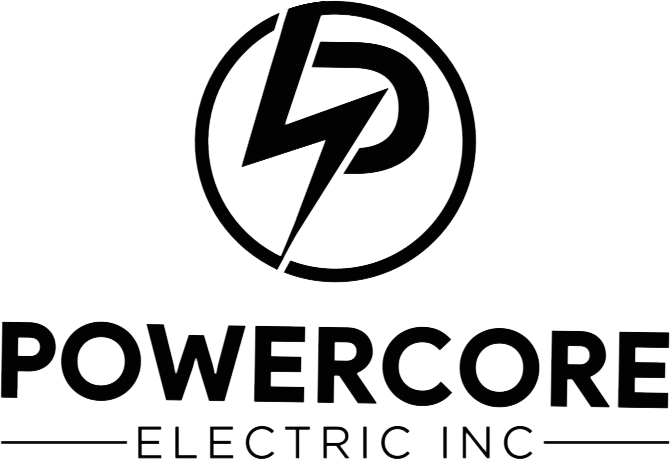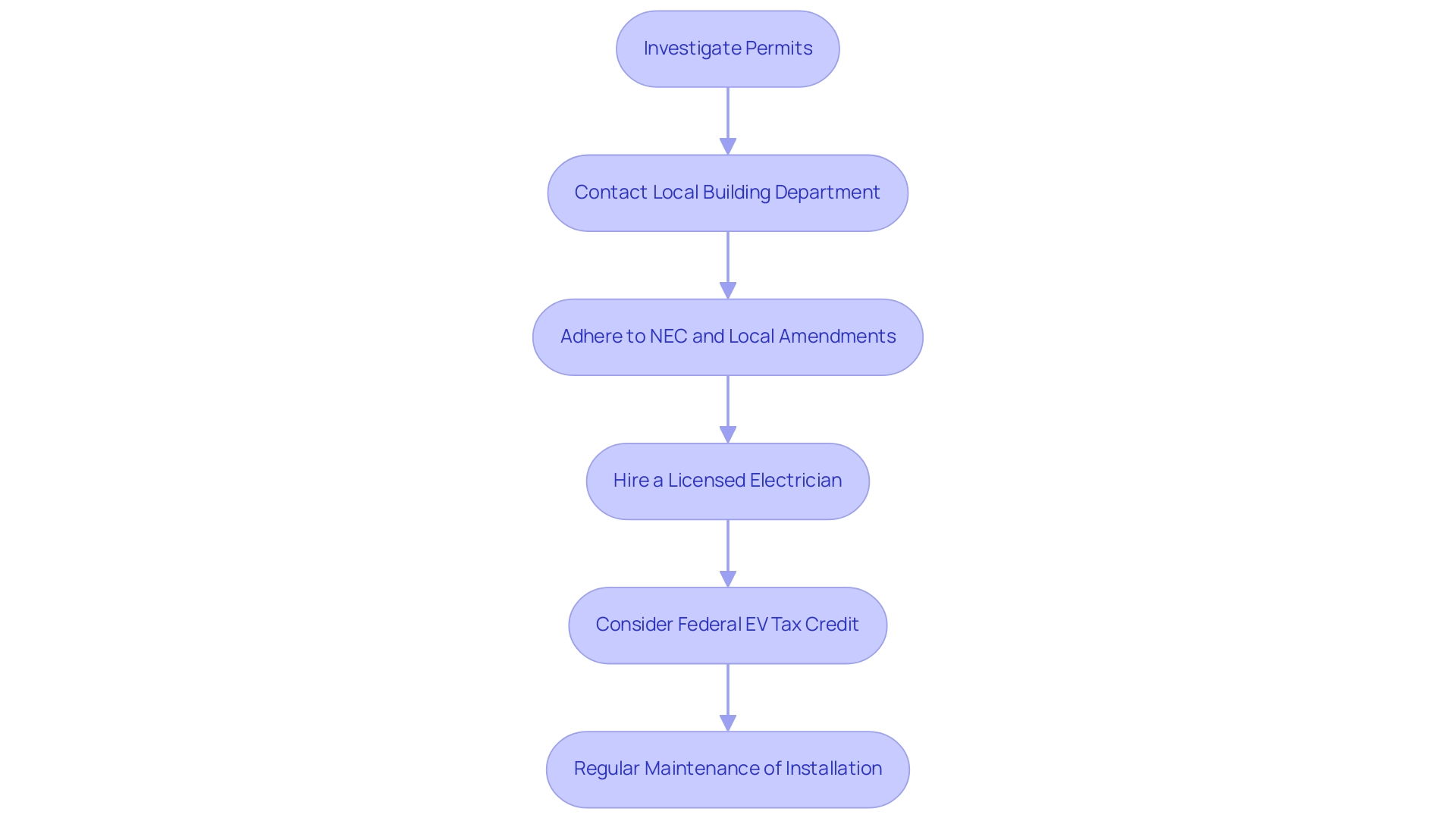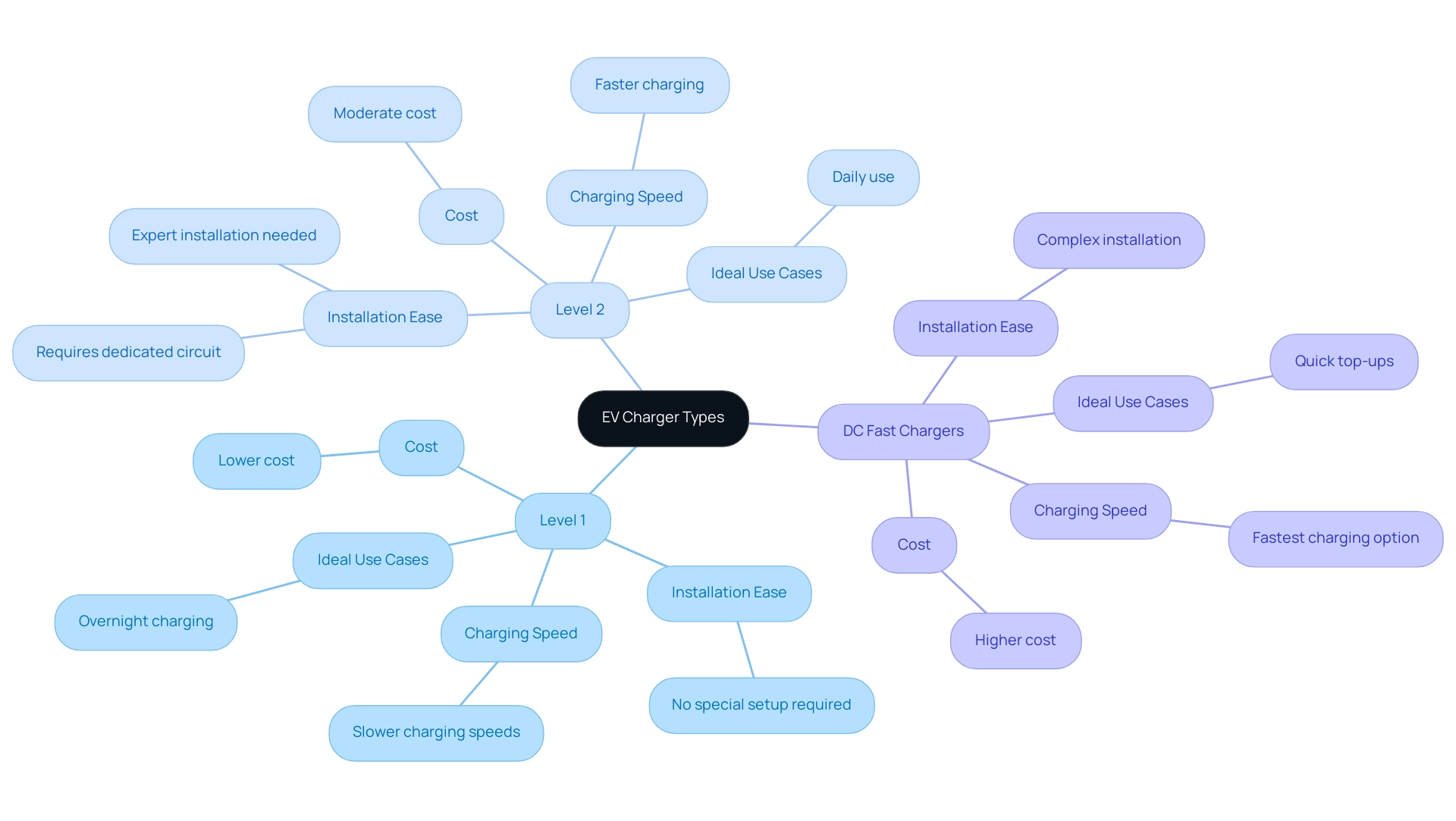Introduction
As electric vehicles (EVs) continue to gain popularity, more homeowners are considering the installation of charging stations at home. This transition not only enhances convenience but also aligns with a growing commitment to sustainability.
However, embarking on this journey can feel overwhelming, especially with the myriad of options and regulations to navigate. From understanding energy needs and selecting the right charger type to exploring financial incentives and ensuring proper maintenance, the process involves careful planning and informed decision-making.
This article serves as a comprehensive guide, offering insights and practical tips to help homeowners seamlessly integrate EV charging stations into their lives while maximizing efficiency and savings.
Planning Your EV Charging Station Installation
To initiate your EV power station project with Powercore Electric, begin by assessing your home’s energy requirements. Studies show that the average electric vehicle (EV) requires approximately 30 kWh of energy for a full charge, so understanding your consumption is key. This data-driven approach will assist you in identifying the appropriate power solution for your household.
Next, carefully select the location for the installation of EV charging stations, considering proximity to your electrical panel and daily accessibility. For example, while California has the most power points, it faces challenges with over 1.2 million registered EVs requiring service from just 43,780 individual public power outlets. This statistic highlights the importance of choosing a location that maximizes your charging access.
Consider whether you’ll be setting up the facility indoors or outdoors—each option has its own set of advantages. A useful suggestion is to create a project timeline that details each stage, from initial planning to the installation of EV charging stations. Don’t forget to involve your family in the conversation!
By discussing everyone’s needs and preferences, you’ll create a more inclusive planning process, making it a true community effort in your home. Furthermore, think about how incorporating solar panels and battery backups can improve your energy efficiency and supply sustainable power for your EV. For detailed guidance on the setup process, refer to our user manuals that outline the steps necessary for a successful configuration.
For more information on our solar panels, battery backups, and general electrical services, feel free to reach out to us at Powercore Electric at ryan.serrano@powercoreinc.net or call us at (916) 699-8778.
Navigating Technical and Regulatory Requirements
Before proceeding with your EV power source setup, it’s essential to investigate the specific permits needed in your region. A great first step is to reach out to your local building department or check their website for detailed guidelines. As one building department official noted, ‘Since requirements vary from jurisdiction to jurisdiction, contacting your local building department is the best way to learn more about permitting fees and the application process.’
Keep in mind that adhering to the National Electrical Code (NEC) and any local amendments is essential to ensure safety and legality in your setup. For those considering a more sustainable approach, Powercore Electric Inc. offers expert services in the installation of EV charging stations, solar panels, and battery backups, ensuring you have a comprehensive solution for your energy needs. Additionally, the federal EV tax credit can offset up to $30,000 of setup costs, making this an important financial consideration.
As an added layer of safety and compliance, consider hiring a licensed electrician for the electrical work. Their expertise not only guarantees your setup meets all necessary standards but also assists you in avoiding any potential setbacks along the way. Furthermore, regular upkeep of the installation of EV charging stations is essential for reliability and user experience, as underscored in a case study that stresses the significance of maintenance for EV charging stations.
By obtaining a clear understanding of these requirements in advance, you’ll facilitate a seamless setup process and appreciate the advantages of your new power point with peace of mind. For more information, you can contact Powercore Electric at ryan.serrano@powercoreinc.net or call (916) 699-8778.
Choosing the Right EV Charger for Your Needs
When it comes to selecting the appropriate EV charging station for your home, it’s essential to understand the three main types: Level 1, Level 2, and DC fast options.
- Level 1 devices are the most straightforward choice, ideal for overnight power replenishment without the requirement for specialized setup; however, remember that they may be slower, frequently requiring an entire night to recharge your vehicle.
- Level 2 power sources considerably accelerate the charging procedure but generally necessitate a dedicated circuit and expert setup to accommodate their heightened energy requirements.
If you’re seeking the fastest top-up choice, DC fast chargers are your best option, but they involve a higher cost and complexity, resulting in their reduced prevalence in residential environments.
At Powercore Electric Inc., we are committed to offering you the appropriate solutions for your electric vehicle requirements, whether it’s a solar panel setup to harness clean energy or a battery backup system to guarantee dependable power. Our commitment to exceptional service, backed by 30 years of experience in California, has resulted in countless satisfied customers who appreciate our efficiency and local expertise.
We provide extensive services, including the installation of EV charging stations, solar panels, and battery backups, ensuring that you have the optimal arrangement for your home. Setting up an EV power source not only offers convenience but also increases the worth of your home while aiding in a sustainable future. Based on the most recent statistics, the actual production of lithium-ion batteries reached approximately 160 GWh in 2021, emphasizing the swift advancement of EV technology and its significance to selection of charging devices.
To further assist your decision, reflect on insights from Greg Sowder, President of Qmerit Network, who states, ‘Rated #1 in customer satisfaction, Qmerit’s experienced network of certified electricians has installed over 450,000 EV fueling stations in homes and businesses throughout the U.S. and Canada!’ Furthermore, the European EV power supply market has experienced a notable rise in publicly available stations, demonstrating a strong dedication to promoting electric vehicle adoption.
To determine the best fit for your home, consider your daily driving habits, how often you use your vehicle, and your budget.
With the appropriate device from Powercore Electric, you can enjoy the convenience of electric vehicle ownership while also contributing to a greener planet. Feel free to contact us at (916) 699-8778 or ryan.serrano@powercoreinc.net for more information on our services, including the installation of EV charging stations and solar panels!
Understanding Costs and Financial Incentives
When it comes to the installation of EV charging stations at home, the first step is to estimate the total costs involved. This encompasses not only the cost of the device itself, but also the installation of EV charging stations and any required electrical enhancements. Depending on the type of charger you select and the intricacy of the setup, costs can differ considerably.
For instance, ChargePoint will be offering a system in 2024 that can deliver 500 kW to a single port, indicating advancements in EV power technology that could influence your decision. To make the most of your investment, it’s wise to research local, state, and federal incentives that can help lighten the financial load. Programs providing rebates or tax credits can significantly reduce setup costs associated with the installation of EV charging stations.
A handy resource for exploring these financial incentives is the Database of State Incentives for Renewables & Efficiency (DSIRE), which can provide you with tailored information based on your location. Furthermore, it’s advantageous to compute and contrast the expenses of powering an EV versus fueling an internal combustion engine car, as these figures can significantly influence your overall savings. For example, a recent case study on Rancho Cucamonga’s electrification effort illustrates how strategic planning and infrastructure investment can facilitate the transition to electric vehicles.
As Jason Fogelson, the managing editor, aptly puts it, ‘Every little bit of savings helps.’ So take the time to uncover all the support available to you as an eco-conscious homeowner! Powercore Electric Inc. not only provides professional installation of EV charging stations but also offers solar panels and battery backups that can improve your home’s energy efficiency.
By integrating these solutions, you can maximize your savings and sustainability. If you need assistance, feel free to reach out to us at ryan.serrano@powercoreinc.net or call (916) 699-8778 for more information.
Maintenance and Operational Considerations for EV Charging Stations
To keep your EV power station running smoothly and to extend its lifespan, regular maintenance is key. Begin by ensuring the power area is clean and free from debris—this simple step can prevent unnecessary wear on your equipment. Make it a habit to inspect the power source for any signs of wear or damage; catching issues early can save you from more significant problems down the road.
It’s also wise to schedule periodic checks with a qualified electrician, like those at Powercore Electric Inc., who specialize in the installation of EV charging stations as well as maintenance. This way, you can be confident that all electrical components are functioning correctly, which is crucial for safety and efficiency. Additionally, don’t overlook the importance of staying informed about software updates for smart devices.
These updates can enhance performance and introduce new features that improve your power-up experience even more. Remember, the estimated lifespan of EV chargers is around 10 years, influenced by how often they’re used and the conditions they face. As highlighted in a recent case study, increased usage raises the risk of damage, necessitating regular maintenance to ensure longevity.
By practicing regular maintenance, including cleaning and securing cables, you can significantly boost the longevity of your charger—especially during adverse weather. This proactive approach not only maximizes your investment but also guarantees trouble-free power supply for many years to come. For more details on EV service points, solar panels, or battery backups, feel free to reach out to Powercore Electric at (916) 699-8778 or email ryan.serrano@powercoreinc.net.
As one industry expert noted, ‘I may think in 2024 that I have access to $100,000 toward EVs. But now all that money’s gone because other developers have already exhausted the funding.’ This underscores the urgency of maintaining your investment in EV infrastructure, particularly the installation of EV charging stations, to avoid missing out on available funding opportunities.
In addition to the installation of EV charging stations, Powercore Electric also provides solar panel installations and battery backup solutions.
Conclusion
Integrating an EV charging station into a home is an exciting and essential step towards enhancing convenience and promoting sustainability. By starting with a thorough assessment of energy needs and installation requirements, homeowners can make informed decisions that align with their lifestyles. Understanding the different types of chargers available—Level 1, Level 2, and DC fast chargers—enables individuals to select the best option based on their driving habits and budget.
Navigating local regulations and financial incentives is equally important. Researching necessary permits and potential rebates can significantly reduce installation costs, making the transition to electric vehicle ownership more affordable. Additionally, regular maintenance of the charging station ensures reliability and longevity, protecting the investment while providing peace of mind.
As electric vehicles continue to shape the future of transportation, embracing this change not only benefits individual homeowners but also contributes to a broader commitment to environmental responsibility. With the right planning, resources, and support, the journey to a sustainable home equipped with an EV charging station can be both manageable and rewarding.




